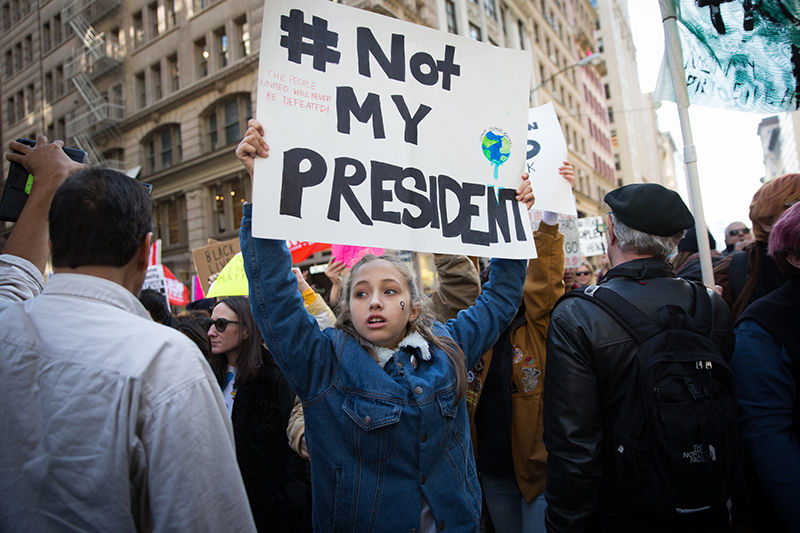“What we’ve got here is failure to communicate.”
So goes the iconic line from the 1967 film “Cool Hand Luke,” courtesy of the “Captain,” a cruel prison warden played by Strother Martin.
That character could have been talking about America today, after one of the ugliest and most toxic presidential elections in modern history.
Anyone who believed that, once the votes were counted on Nov. 8, a divided country could start to heal must have been sorely disappointed with what happened next. The United States seems more divided now than it was before the election.
Tempers are short. Feelings are hurt. Emotions are frayed. It’s no longer possible to agree to disagree. Everything is accompanied by a moral judgment. Motives are immediately questioned. There is little respect and no room for nuance. Overall our national discourse has gradually become more polarized, more personal, more presumptuous and more petty.
If you and I happen to see something differently — like, say, a contentious presidential election — we obviously both can’t be right. In our grandparent’s generation, they might have said: “Well, we just disagree.” For our parents, it became: “Well, you must be wrong.” Now, for us, it’s more like: “How could you think that? You’re a horrible person!”
Why, it’s enough to think those previous generations were at least half right about those two subjects you’re not supposed to talk about in polite company: politics and religion.
Those who supported President-elect Donald Trump are on the defensive, assailed by those who voted for Hillary Clinton. And those Clinton supporters can’t help but ascribe sinister motives to the Trump voters; after all, didn’t Clinton herself refer to them, in an unguarded moment, as a “basket of deplorables”?
A big part of the reason is that the country has, for several years now, been undergoing what might be called a crisis in communication. Simply put, Americans have lost the ability to talk to one another in a respectful and civil way.
How many people realize that the most important part of communication is something that requires no words at all? It’s listening. Americans don’t listen to one another anymore, if we ever did. Our kids are mimicking our behavior.
A friend who teaches communications studies and debate at a small Christian college recently told me over lunch that he has his students do an exercise called “yes, but, and.” Such as: “Yes, I see your point. But you should consider this other factor. And there is also this issue.”
Curious, I asked him what part of the exercise his students had the most trouble with. He quickly answered, “The first part. They can never seem to concede the other person’s point because, most of the time, they’re not listening close enough to catch it. They’re so eager to state their opinion, that they never hear anyone else’s.”
You see the problem. We don’t talk to each other. We talk at and over one another. No society can go on like this.
How did we get here? On Nov. 25, 1993 — Thanksgiving Day — Democratic strategist James Carville and Republican strategist Mary Matalin, the ultimate political odd couple, were married in a Catholic church in New Orleans.
This kind of “mixed” marriage seems almost quaint now, and it’s likely it would have never survived the Trump-Clinton matchup of 2016. In the 23 years that Carville and Matalin have been married, this country has had three presidents who served two terms (Bill Clinton, George W. Bush and Barack Obama). All three of these leaders were loved and hated, and all three left the country more divided than they found it.
When asked how they have managed to keep a happy marriage, both Matalin and Carville have said in interviews that they don’t talk politics at home. They may be onto something.
For some Americans, talking politics ruined Thanksgiving dinner, as some family members were — according to an article in USA Today, leading up to the holiday — actually uninvited because they voted for the wrong person. Of those who showed up, and dared broach the subject, I would imagine that many left the table in a huff before the pumpkin pie was served.
We need to mind our manners, learn from our mistakes and stop taking ourselves so seriously. If we do all that, we might just salvage Christmas.
Ruben Navarrette is a syndicated columnist with The Washington Post Writers Group, a member of the USA Today Board of Contributors, a columnist for the Daily Beast, author of “A Darker Shade of Crimson: Odyssey of a Harvard Chicano” (Bantam), and the editor of MOSH OPINIONS — the opinion page of the multi-platform digital media company MOSH.US.

